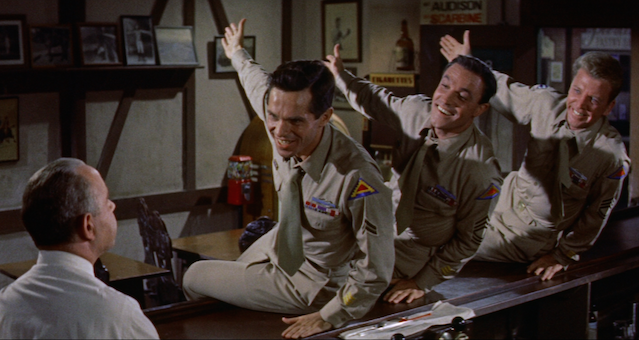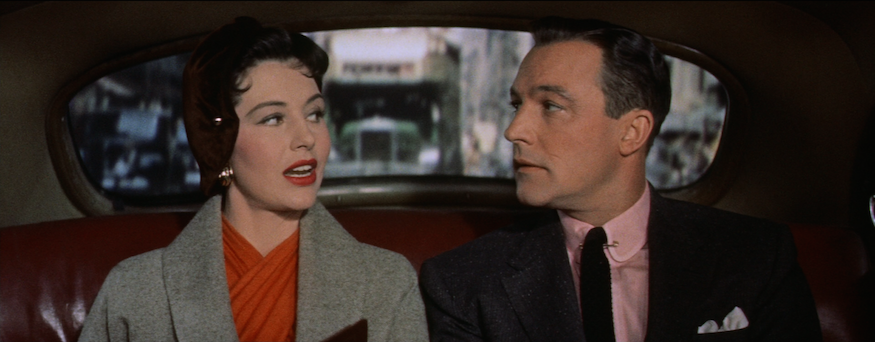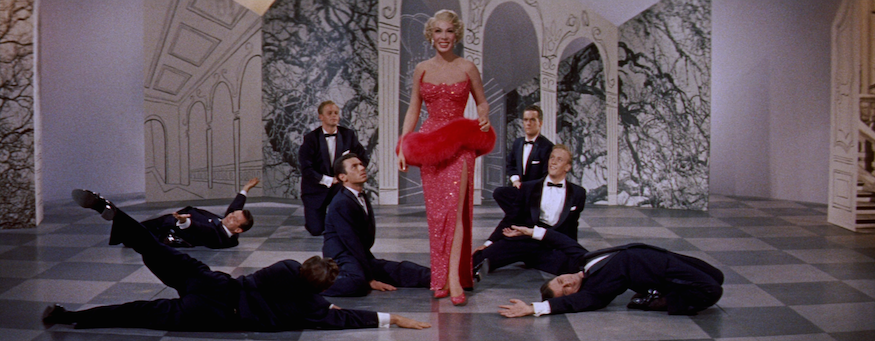| Reviews & Columns |
|
Reviews DVD TV on DVD Blu-ray 4K UHD International DVDs In Theaters Reviews by Studio Video Games Features Collector Series DVDs Easter Egg Database Interviews DVD Talk Radio Feature Articles Columns Anime Talk DVD Savant Horror DVDs The M.O.D. Squad Art House HD Talk Silent DVD
|
DVD Talk Forum |
|
|
| Resources |
|
DVD Price Search Customer Service #'s RCE Info Links |
|
Columns
|
|
|
It's Always Fair Weather
The Movie:

Critics and fans have already appropriately canonized Singin' in the Rain as a musical film classic, but they seem to consistently forget about the jaw-dropping next (and final) combined effort from directors Gene Kelly and Stanley Donen, writers Betty Comden and Adolph Green, and producer Arthur Freed.
Of course, It's Always Fair Weather from 1955 had a famously difficult shoot, with Donen resentful of being called in to co-direct when he was doing just fine on his own, career-wise. Plus, the initial audience response was cool, with the film doing little better than breaking even, box office-wise. But, the proof is in the pudding and, creativity-wise, this follow-up is an unmitigated triumph.
Then again, maybe the film just plays better if you've got a bit of darkness in your soul. Despite its desperately optimistic title, It's Always Fair Weather is an often sharp (one hesitates slightly to say "cynical") depiction of post-World War II disillusionment. In other words, by 1955, the Greatest Generation wasn't doing so great. The story illustrates this fall from optimism by featuring three war buddies -- Ted (Gene Kelly), Doug (Dan Dailey), and Angie (Michael Kidd) -- who make a pact to meet again at their favorite New York bar exactly ten years after the day they are discharged from the army.
When the former G.I.s hesitantly meet back up, it's nothing like old times. Ted, who was planning on becoming a lawyer, instead has become a small-potatoes hustler who recently won a boxer in a card game and figures he'll give managing in the fight racket a try. Doug, who was planning to become an artiste, has instead become a bitter advertising executive, responsible for drawing insipid ad campaigns, speaking in meaningless jargon ("situation-wise," "saturation-wise"), and pushing his wife to divorce him. Finally, Angie, who had dreams of becoming a chef, instead became a family man who runs a hamburger stand in Schenectady that he nonetheless calls "The Cordon Bleu." When the three men see what they've become through the eyes of their former pals... well, they hate it. And they end up hating each other besides.
If that premise sounds a bit dour, in execution, Fair Weather is anything but. The film is packed to the gills with stunning dance numbers that dazzle both in their on-the-day execution and in the way cinematic effects are used to accentuate them. For example, the mournful "Once Upon a Time" number shows its three leads, in three different locations, in split screen, executing the exact same graceful dance moves as they bemoan their lost friendship. "I Shouldn't Have Come," a comic tune set to the "Blue Danube," is sung entirely in voice-over with the three actors silently sitting side-by-side, using their facial expressions, coupled with careful framing and editing, to create the tense dynamic of the scene.
It seems inevitable that the three former friends will reconcile, so smarty-pants ad woman Jackie Leighton (Cyd Charisse), who works at Doug's agency, suggests the trio be tricked into appearing in a This Is Your Life-type segment on a live TV variety show that the agency is producing later that same night. Inveterate hustler Ted lets his attraction for Miss Leighton be known within milliseconds of setting eyes on her (can you blame him?), so she decides to play along and babysit him until the show starts. This leads to a tremendous dance number in the boxing gym, "Baby You Knock Me Out," in which Cyd Charisse proves she's as much an athlete as any of the busted-nose palookas in the background behind her.
Theater star Dolores Gray plays the wonderfully "showbiz"-y host of the TV show that is set to feature the three men's story. Her comic instincts are as impressive as her pipes, and her late-film solo number "Thanks a Lot, But No Thanks," plays as an amusing retort to the "Diamond's Are a Girl's Best Friend" sequence in Gentlemen Prefer Blondes, while offering an energy boost right when the flick looks like its about to sag.
Thankfully, it never does. Famously, Michael Kidd got his solo number cut from the film -- most likely due to jealousy coming from co-star/co-director Gene Kelly -- but the film benefits from not sprawling out to a full two hours. Sure, it's hardly fair (ha ha), considering that Dan Dailey gets to go hog wild in a number where his character is blackout drunk, wreaking havoc on his boss's lavish apartment, and Kelly executes the most gorgeous tap scene ever committed to film (yeah, it's hard to top the Nicholas Brothers in Stormy Weather, yet Kelly does, in my book). But, you know, sometimes decisions that were made for bad reasons turn out good anyway.
And let's just take an extra second to appreciate the ingenuity and insanity of Gene Kelly's big number. While performing a song called "I Like Myself" (a sly joke on the singer by Comden and Green?), Kelly dances in roller skates. Sometimes tapping, sometimes sailing along on a mock-New York street, he does it all in relatively long takes so that we can tell he's doing the switch in style for real. We can see that they haven't subbed in skates with locked wheels to make it easier. He's doing something so physically difficult, but with the same aplomb and casual ease as when he smiled and told the heavens to "come on with the rain."
If you don't like It's Always Fair Weather, I don't know what to tell you. Maybe you're emotionally stunted. Maybe you've never had a hard day in your life, so you don't know the relief that comes from experiencing pure joy. That's what this movie is. It is a bizarrely joyful expression of despondency and disenchantment. Yep, nutshell-wise, that's what it is.

The Blu-ray
The Video:
Another great upgrade from Warners. This AVC-encoded 1080p 2.55:1 presentation has a healthy bitrate, giving the robust transfer plenty of room to stretch out. Colors are vivid, while contrast is strongly delineated. Good fine detail reproduction and no crushing in the shadows. Certain shots -- especially those involving optical effects -- stand out as having a less precise, dupe-y look, but that's an inevitable side effect of the good ol' photochemical days.
The Audio:
The film was given a surround remix for its 2006 DVD release and we are treated to a lossless DTS-HD MA 5.1 surround upgrade here. There's not much business in the surrounds during the dialogue scenes: it's pretty front-and-center-focused. During the musical numbers, however, the whole soundstage is put to work, and to great effect. The disc offers one subtitle option: English SDH.
Special Features:
These are all carried over from the DVD, although it's nice to see one of the cartoons and the outtake footage get up a bump up to proper HD.
- Going Out on a High Note (16:22) - A retrospective featurette that deals with the tumultuous development and production of the film, which was one of the last from Arthur Freed's musical unit at MGM.
- MGM Parade excerpts (9:33 total) - Two brief promotional clips from MGM's TV show, showing Cyd Charisse and Gene Kelly's big numbers as they were never intended: in black and white, and cropped to 1.33:1.
- Deputy Droopy (6:35) - One of the all-time looniest Droopy Dog cartoons has two varmints trying to rob a safe in the sheriff's office without making a sound but, once Deputy Droopy starts setting booby traps that make the bad guys want to yell out in pain, they are continually forced to run away, have a good yell, and then try again.
- Good Will to Men (HD, 8:30) - A remake of sorts of the 1939 anti-war cartoon Peace on Earth. A bunch of mice gather in a destroyed church to celebrate Christmas, now that men have blown each other to bits with nuclear bombs.
- Outtakes (HD, 15:47 total) - First, there's Michael Kidd's missing solo number "Jack and the Space Giants," presented with incomplete rehearsal audio, followed by Gene Kelly and Cyd Charisse's dance duet "Love is Nothing But a Racket," which sounds like a fleshed-out arrangement, but is lacking dialogue and spoken asides. Both are impressive stand-alone pieces, but I honestly don't miss them in the film. Next, are a few moves cut out of an early trio number with the three soldiers, nicknamed "The Binge." Last is an audio-only outtake, "I Thought They'd Never Leave," presumably sung by Dolores Gray.
- Trailer
Final Thoughts:
I had to think about this final grade for a second. The bonus features ported over from the original DVD of this film are solid -- good, but not really great -- and I found myself hungering for more. On the other hand, It's Always Fair Weather is one of the most inventive and emotionally layered productions of the classic movie-musical era. It's an all-time great. And the A/V upgrade on the Blu-ray is extremely satisfying. Aw, who am I kidding? This one easily deserves inclusion in the DVD Talk Collector Series.

Justin Remer is a frequent wearer of beards. His new album of experimental ambient music, Joyce, is available on Bandcamp, Spotify, Apple, and wherever else fine music is enjoyed. He directed a folk-rock documentary called Making Lovers & Dollars, which is now streaming. He also can found be found online reading short stories and rambling about pop music.
|
| Popular Reviews |
| Sponsored Links |
|
|
| Sponsored Links |
|
|
| Release List | Reviews | Shop | Newsletter | Forum | DVD Giveaways | Blu-Ray | Advertise |
|
Copyright 2024 DVDTalk.com All Rights Reserved. Legal Info, Privacy Policy, Terms of Use,
Manage Preferences,
Your Privacy Choices | |||||||













